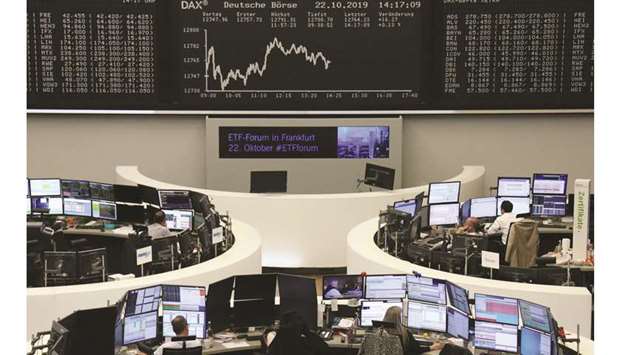The pound slipped yesterday awaiting key votes on Prime Minister Boris Johnson’s EU withdrawal bill, but analysts said its downside was capped by broad optimism that a no-deal Brexit will be avoided.
Global stock markets meanwhile rose on growing expectations that China and the United States will sign a partial trade deal next month.
Sterling’s modest decline came a day after it hit a five-month peak at $1.3013, after parliament forced Johnson to request another extension to Britain’s scheduled exit from the European Union.
In Europe, London’s FTSE 100 rose 0.7% to 7,212.49 points, Paris’s CAC 40 gained 0.2% to 5,657.69 points and Frankfurt’s DAX 30 was up 0.1% to 12,754.69 points at the close yesterday.
The pound switched hands at $1.2930 in late European business yesterday, down from $1.2960 late in New York on Monday.
“The pound has dipped a little but remains well supported on the whole and not too far from recent highs,” noted David Cheetham at XTB.
But it was also obvious that traders were largely flying blind, with political proceedings difficult to call.
“If the whole Brexit process has taught us anything it is that trying to predict the next political development is something of a fool’s errand,” he said.
Johnson published his hotly awaited withdrawal agreement bill (WAB) late on Monday, with just over a week to go until Brexit on October 31.
“The Brexit saga rumbles on today as MPs debate and vote on the WAB in what is likely to be the first of a few excruciating and long sessions in parliament,” said Oanda analyst Craig Erlam.
Johnson faces two Brexit votes that could decide if he still has a reasonable shot at securing his EU divorce by next week’s deadline.
Firstly, the Conservative leader hopes parliament gives initial support to a Brexit bill that translates the revised withdrawal agreement he struck with Brussels last week into UK law.
Secondly, he hopes the lower House of Commons will vote in favour of a speedy timescale to pass the entire legislation in just three days.
The rapid timetable has sparked outcry from opposition lawmakers.
Even if the withdrawal bill “passes there’s a fair chance that a vote on the timetable shortly afterwards will fail”, said XTB analyst David Cheetham.
“Several MPs have already voiced their displeasure at the lack of time to scrutinise the bill,” he added.
Foreign exchange traders mostly ignored Johnson’s last-minute warning to MPs that if they vote against the timetable to push his EU divorce deal through parliament this week he will abandon the legislation.
Global stock markets meanwhile received some support from easing trade war concerns amid “growing expectations that the US and China may finally clinch a partial deal at next month’s Apec meeting in Chile”, said Ipek Ozkardeskaya at London Capital Group.
US President Donald Trump reinforced hopes Monday that he and Chinese counterpart Xi Jinping will be able to put pen to paper on a mini pact, saying China had already started promised purchases of farm goods, and that the first part of a wider commitment was almost complete.
“We’ll be able to, we think, sign a completed document with China on phase one,” Trump said at the White House, adding they would then move on to the next phases.

The German share price index DAX graph is seen at the Frankfurt Stock Exchange. The DAX 30 was up 0.1% to 12,754.69 points yesterday.
